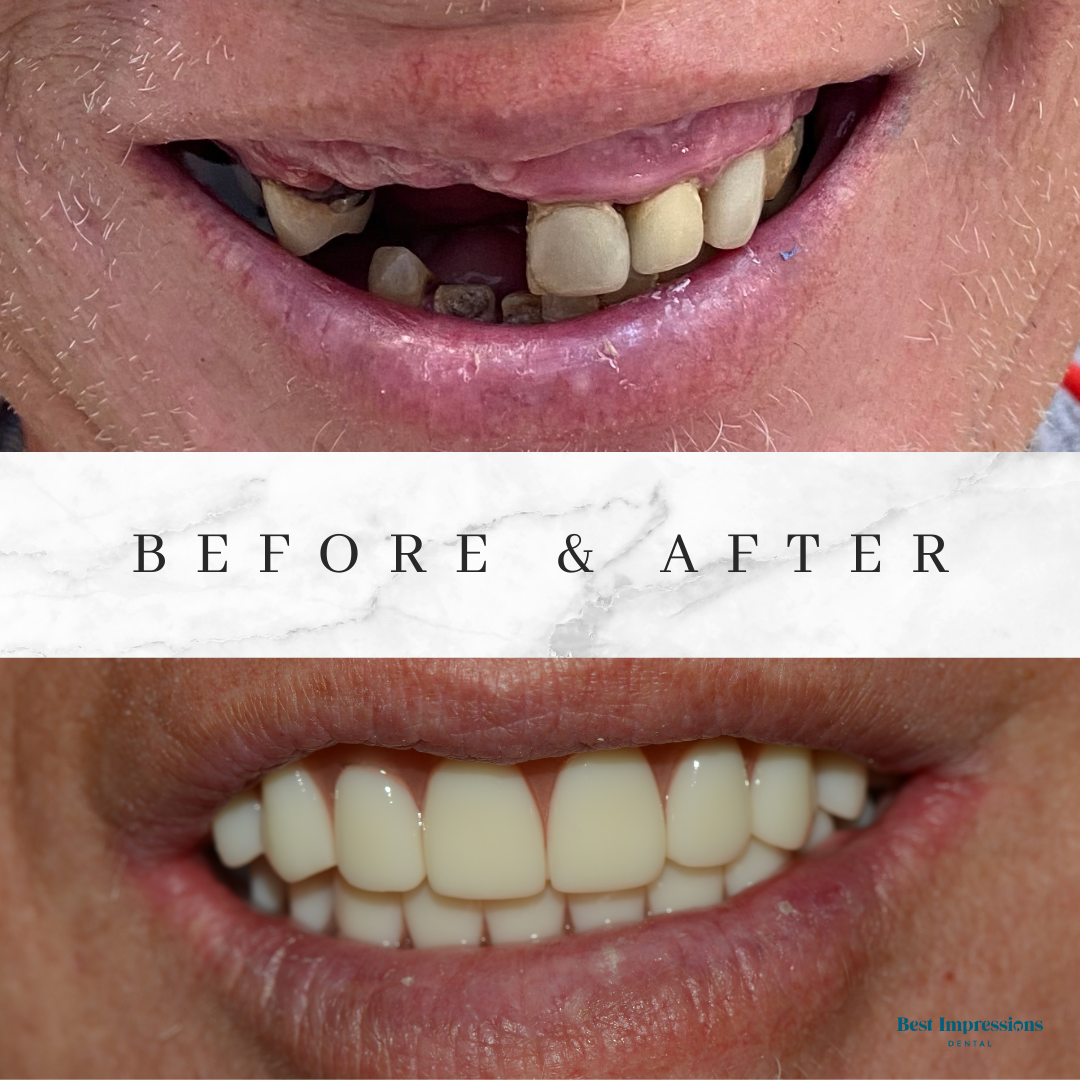Understanding Dentures: A Comprehensive Guide to Choosing the Best Option (Part 1 of 4)
Welcome to the first blog in a four-part series from Best Impressions Dental, focusing on the world of dentures. Our aim is to help you better understand your options, navigate through the terminology, and ultimately make an informed decision if dentures become necessary. In this initial post, we will explore the different types of dentures and the unique attributes of each.
Dentures serve as removable replacements for missing teeth and surrounding tissues. They offer an excellent solution for those who’ve lost their natural teeth due to injury, gum disease, or decay, restoring function and appearance. At Best Impressions Dental, we provide various denture options tailored to meet individual needs and budgets.
- Conventional Dentures (average cost $2,000 – $3000): These full dentures replace all teeth on either arch. They are typically fitted after a patient’s teeth have been extracted or if the patient is edentulous (missing all teeth). Conventional dentures are the least costly option but can present several challenges:
- They require proper care, including soaking, cleaning, and maintaining hygienic habits at home, coupled with dental visits to ensure tissue health and in-office denture disinfectant procedures.
- They are held in place by adhesive or natural suction, often needing both.
- Achieving proper function may be challenging due to the patient’s bone level and gingival tissue health.
- They may interfere with pronunciation and taste due to full palatal coverage.
- Interim Dentures: These are temporary dentures made for insertion directly after the patient has had teeth extracted. Interim dentures are primarily used to maintain aesthetic appearance, occlusion, and phonetics during the healing process while the conventional denture is being fabricated.
- Partial Dentures: This type of denture is used to replace one or several missing teeth but does not cover the entire arch. They clasp onto surrounding teeth or implants to hold in place.
- Implant Supported/Retained Dentures (average cost ranges from $10,000 to $35,000): This category includes dentures that snap in or are screwed onto dental implants. They offer several benefits:
- Implants secure the denture in place, providing sturdiness and stability.
- They stimulate the bone, minimizing bone resorption.
- They offer improved comfort and efficiency in chewing, enhancing digestion.
- The need for adhesive is eliminated.
- They deliver superior long-term results, although they represent a larger upfront expense.
Within the implant-supported category, there are two major types:
- Implant Retained Dentures (average cost $10,000 – $15,000): Also referred to as Locator retained dentures, these are more cost-effective options that snap onto implants to keep the denture in place. They are removable, allowing the patient to clean the appliance at home and require less maintenance.
- Implant Supported Dentures (average cost $30,000 – $35,000): Often referred to as All-on-4 or All-on-5, these dentures are screwed down into implants, making them a fixed appliance. They cannot be removed by the patient and require diligent maintenance at home. Regular cleanings in office are also required, and only a dentist can remove this appliance for cleaning or continuing care. Choosing between these denture types depends on several factors, including budget, lifestyle, oral health, and personal preference.When selecting dentures, another key aspect to consider is the quality of the dentures themselves. At Best Impressions Dental, we offer two main options:
- Standard Dentures: These are generic, less appealing in terms of aesthetic features, and the teeth wear quicker. They are also less stain-resistant, and the color choices are limited. Although the denture base has a smooth gum appearance, due to reduced insurance coverage, the lab-selected materials may not offer the highest quality, strength, wear resistance, and aesthetics.
- Premium Dentures: Custom-made with more aesthetically pleasing features, premium dentures have an enhanced natural appeal. They have a high wear and stain resistance, and the tooth quality is extra-high density and highly wear-resistant. They come with broad color choices, and the denture base has additional customization for a more natural look. However, choosing premium dentures comes with an extra lab cost that is not covered under insurance.
Stay tuned for the next part of this series, where we will dive deeper into the process of getting dentures and what you can expect during this journey. At Best Impressions Dental, our goal is to provide you with a dental solution that brings back your confident smile. Contact us today to learn more about our services and to discuss the best denture options for you.

